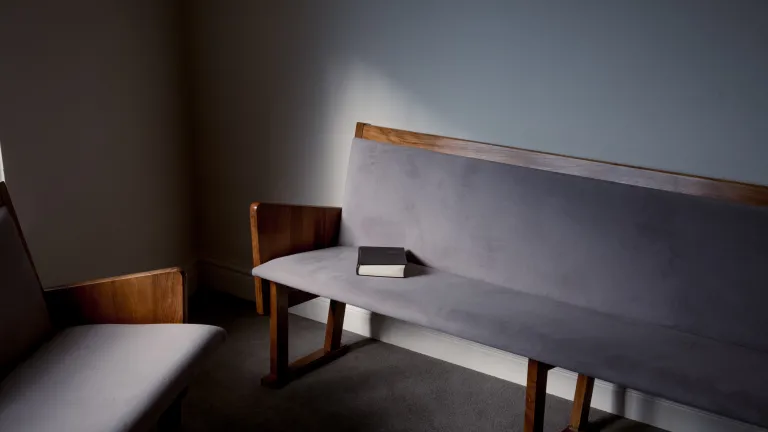Was the Saturday Sabbath Changed to Sunday?

No, God has not authorized a change in His Sabbath. Humans changed it after the last of the apostles died, but with no scriptural authority or legitimacy.
Well, it ultimately depends on who you ask.
If you ask the Roman Catholic Church and the majority of Christian churches in the world today, the answer is yes.
However, if you are more concerned with what God Himself says and what He outlines in His Word for those who truly desire to follow Him, the answer might surprise you.
The Sabbath has been around for a long time—God instituted it at creation (Genesis 2:1-3). After God created the heavens and the earth, he rested on the seventh day—instituting a seven-day cycle of work and rest that has continued throughout history (Exodus 34:21).
When Moses received the Ten Commandments from God, it’s important for us to recognize that the Sabbath had already been established from creation, but the Israelites had forgotten after centuries of slavery under Egyptian rule. God reinstituted a number of essential laws for the Israelites from the top of Mt. Sinai, establishing what we now know as the Ten Commandments.
Exodus 20:8-11 records this specific law as given to the Israelites at Sinai:
“Remember the Sabbath day, to keep it holy. Six days shalt thou labour, and do all thy work: But the seventh day is the Sabbath of the LORD thy God: in it thou shalt not do any work, thou, nor thy son, nor thy daughter, thy manservant, nor thy maidservant, nor thy cattle, nor thy stranger that is within thy gates: For in six days the LORD made heaven and earth, the sea, and all that in them is, and rested the seventh day: wherefore the LORD blessed the Sabbath day, and hallowed it” (King James Version).
So we can see that the Sabbath is Holy, sanctified and set apart—made so and declared so by God. We and those within our household are not to do our customary work on that day, and we are commanded by God to rest.
Leviticus 23 adds some additional context, listing the "Feasts of the Lord"—the Holy Days that outline and commemorate the various components of the plan of God for mankind. The first Feast listed, in Leviticus 23:3, is the Sabbath. Notice that they are God's Feasts—not Israel's. He was simply telling Israel about them, and how to observe them.
This is important because it illustrates to us that the Sabbath is not Jewish, it’s wasn’t just for the Israelites, it’s not just for those under the Old Covenant. Rather, the Sabbath is the Lord’s, and it is to be a Holy convocation for His people. They are instructed—in addition to resting, not doing any work, and keeping it holy—to assemble together and worship God on the Sabbath. The Sabbath is a Holy convocation, a day set apart for worship.
The Jewish people were entrusted with the "oracles" of God (Romans 3:1-2). The word oracle comes from the Greek word, λόγιον (logion) which is translated "utterance."
Expositors Bible Commentary discusses this concept:
"The Greek logia is related to logoi (e.g., John 14:24) but has a specialized meaning. 'Oracles' is the usual rendering. It has this meaning in classical Greek, where it is used especially for divine utterances, often for those preserved and handed down by earlier generations" (Expositors Bible Commentary, 1976, Volume 10, Page 35).
The utterances the Jewish people were entrusted with were the very words of God, given to them by direct revelation, and they faithfully passed down what they were entrusted with from generation to generation. This included the Sabbath.
“To be 'entrusted' with the divine oracles obviously means more than to be the recipient of them. Actually, it means even more than to be the custodian and transmitter of them. What is called for, in the light of the meaning of logia is faith and obedience” (Expositors Bible Commentary, 1976, Volume 10, Page 35-36).
The degree of responsibility placed upon the Jewish people to preserve the word of God for future generations was not a responsibility they took lightly. As a result of this, the Jews made numerous legal interpretations throughout history based upon the law of God, creating 39 separate rules, complete with sub-rules that would build a fence around the Sabbath so that a person wouldn’t break it. This included things such as how many steps you could take, how many letters you could write or whether you could carry anything.
When Jesus Christ made the Pharisees upset by healing on the Sabbath in the New Testament (Mark 3:1-6), or by gathering heads of grain as he walked with His disciples (Matthew 12:1), He had broken the rules that men had imposed upon the Sabbath, not the law of God. Jesus Christ lived without sin, He did not transgress the law of God (2 Corinthians 5:21). This emphasis of man's additions to the law of God was a frequent point of contention between Christ and the Pharisees.
Jesus Christ and the apostles worshiped and taught on the Sabbath day throughout the New Testament account in numerous places, and there are records that this practice continued beyond Christ’s death and resurrection into the Ante-Nicean period of the Church. During this time period, heresies and various pagan practices began to creep into the Church.
Beginning about 100 years after the death of Jesus Christ, the writings of pseudo-Barnabas and Justin contain references to worship on the first day of the week, and it began to become the norm during the rule of Emperor Hadrian between 117-135 A.D. Hadrian greatly persecuted the Jewish people, and specifically prohibited many aspects of what he perceived as Judaism, including worship on the seventh-day Sabbath. The small group of Christians that remained faithful to Christ and his teachings were forced to worship God on the Sabbath as secretly as possible.
Constantine the Great, a worshipper of the pagan Roman sun god Sol Invictus, famously converted to Christianity at the Battle of Milvian Bridge in A.D. 312. He claimed he saw a vision of a fiery cross in the sky before the battle, which led him to become a Christian and conquer his enemy, the Roman Emperor Maxentius.
Several years later, he dictated the following edict which established a national day of rest on Sunday, the holy day of Sol Invictus.
"On the venerable Day of the Sun let the magistrates and people residing in cities rest, and let all workshops be closed. In the country, however, persons engaged in agriculture may freely and lawfully continue their pursuits; because it often happens that another day is not so suitable for grain-sowing or for vine-planting; lest by neglecting the proper moment for such operations the bounty of heaven should be lost. (Given the 7th day of March, Crispus and Constantine being consuls each of them for the second time [A.D. 321]" (Codex Justinianus, lib. 3, tit. 12, 3).
With this edict, Constantine effectively combined pagan worship practices from the Roman sun god he worshiped with aspects of his new-found Christianity. This pattern is replicated throughout early Roman Catholic History.
Johns D. Parker records in his book, The Sabbath Transferred the following words from Constantine’s court recorder Eusebius:
“On this day, which is the first of light and of the true sun, we assemble after an interval of six days, and celebrate holy and spiritual Sabbaths, even all nations redeemed by him throughout the world, and do those things according to the spiritual law which were decreed for the priests to do on the Sabbath . . . And all things whatsoever that it was the duty to do on the Sabbath, these we have transferred to the Lord’s Day as more honorable than the Jewish Sabbath” (Parker, Johns D., The Sabbath Transferred, 1902, pages 93-94).
So was the Sabbath changed from Saturday to Sunday?
Yes, Hadrian, Constantine, Eusebius and others of the Ante-Nicean Church leadership slowly changed the day of worship from Saturday to Sunday. But the bigger and far more important question is: Did they have the biblical authority to do so and does God Himself approve?
Absolutely not.
The Roman Catholic Church has long claimed the right to make doctrinal changes as they see fit, feeling that the Pope is in place of God on earth.
Pope Leo XIII in an 1894 letter said, “We (the Popes) hold upon this Earth the place of God Almighty."
An 1895 Catholic newspaper, The Catholic National, said, “The Pope is not only the representative of Jesus Christ, but he is Jesus Christ himself hidden under the veil of flesh.”
Additionally, the Saint Catherine Catholic Church Sentinel from May 21, 1995, had the following to say:
“Perhaps the boldest thing, the most revolutionary change the Church ever did, happened in the first century. The holy day, the Sabbath, was changed from Saturday to Sunday. 'The Day of the Lord' (dies domini) was chosen, not from any direction noted in the Scriptures, but from the Church's sense of its own power . . . People who think that the Scriptures should be the sole authority, should logically . . . keep Saturday holy” (emphasis added).
Cardinal James Gibbons, the Archbishop of Baltimore, was also very open about the change from the seventh-day Sabbath to Sunday.
“You may read the Bible from Genesis to Revelation, and you will not find a single line authorizing the sanctification of Sunday. The Scriptures enforce the religious observance of Saturday, a day which we never sanctify. The Catholic Church correctly teaches that our Lord and His Apostles inculcated certain important duties of religion which are not recorded by the inspired writers . . . We must, therefore, conclude that the Scriptures alone cannot be a sufficient guide and rule of faith” (Gibbons, James, The Faith of our Fathers, 1917, page 89).
We respectfully disagree.
Anyone that loves God and Jesus Christ will obey His teachings, those who do not—will not (John 14:23-24).
God instituted the Sabbath. He expected His chosen people Israel to keep it, to maintain it, worship on it and pass it on to others. Jesus Christ taught and worshiped on the Sabbath, his apostles taught and worshiped on the Sabbath. Scripture contains no references whatsoever from Genesis to Revelation that sanctifies Sunday as the day of worship.
God doesn’t change. He is the same yesterday, today and forever. He is the Alpha and the Omega (Malachi 3:6; Hebrews 13:8, Revelation 1:8). As such, does His established and chosen day of rest and worship change without clear statement from Him?
Was the Sabbath changed to Sunday? Yes.
Should it have been? No.
Therefore, if we are individuals interested in truly pleasing God and showing Him our love, we must hear and do (Matthew 7:24-29; James 1:22-25) and worship our great God on His Holy Sabbath day in spirit and in truth (John 4:23-24).
📖 Get Your FREE Bible Study Aid: "Sunset to Sunset: God's Sabbath Rest"
Find Out More... The Sabbath: Saturday or Sunday
Was the Biblical Sabbath Changed to Sunday?
History and the Bible show that the biblical Sabbath is Saturday, the seventh day of the week. But most of today’s churches gather to worship on Sunday, the first day of the week. How was this changed and why? Does God accept this change?
What Is the Biblical Sabbath, and Why Do Many Christians Worship on Sunday Instead?
The seventh-day Sabbath, established at creation and reinforced in the Ten Commandments, has remained a sacred day of rest and worship throughout history. Despite widespread shifts to Sunday observance, faithful believers have upheld the biblical Sabbath from Christ’s time to the present day.
Surprising Admissions About the Sabbath and Sunday
Leaders and authorities from many religious denominations candidly acknowledge that Saturday is the biblical Sabbath day and that there is no biblical basis for Sunday observance.
Which Day is the Sabbath According to the Bible?
Which day is the Christian Sabbath? Since most churches observe Sunday as their day of rest and worship, many people assume that Sunday is the Sabbath. Is it? And how do Christians observe the biblical Sabbath day?
Was Sunday the New Testament Day of Worship?
Nowhere in the New Testament does it show the day of rest - the Sabbath - being moved to Sunday.
Was the Sabbath Changed in the New Testament?
The Gospels reveal that Jesus observed the Sabbath day and showed the true purpose and intent of the Sabbath commandment.
What Did the Early Church Believe and Practice?
Shouldn't you look into your Bible to see if your beliefs and practices square with what Jesus Christ and the apostles practiced and taught?
The Fourth Commandment: Key to a Relationship With Our Creator
4. "Remember the Sabbath day, to keep it holy." The Fourth Commandment, to remember the Sabbath, concludes the section of the Commandments that specifically helps define a proper relationship with God—how we are to love, worship and relate to Him. It explains why and when we need to take special time to draw closer to our Creator on the seventh day.






